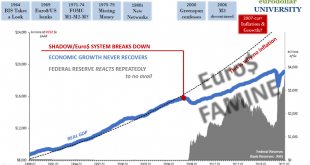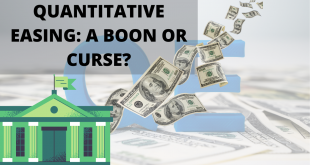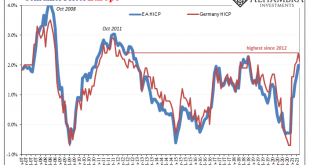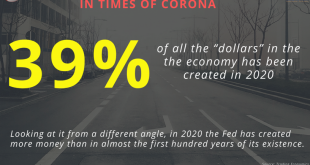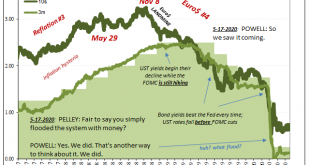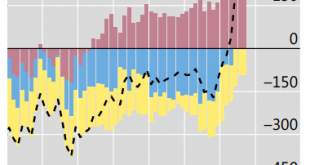Goodreads rating 4.19. Graeber’s book contains many interesting historical observations but lacks a concise argument to convince a brainwashed neoclassical economist looking for coherent arguments on money and debt. After 60 pages, 340 more seemed too much. Chapter one: … the central question of this book: What, precisely, does it man to say that our sense of morality and justice is reduced to the language of a business deal? What does it mean when we reduce moral obligations to debts? …...
Read More »The Two Big Anniversaries of August: The Lost Decade (plus) Of The ‘Fiat’ Half Century
As my esteemed podcast co-host Emil Kalinowski has already mentioned (recurrently), we have, this year, two major anniversaries during these dog days of summer circled on our calendar. Today is, obviously, August 9 and for anyone the slightest familiar with the eurodollar story, that date is seared into their consciousness for as long as it will take to rebuild from the ashes created by the monetary fire lit that day. It has been, sadly, fourteen long years and only...
Read More »Quantitative Easing: A Boon or Curse?
Central banks’ massive Quantitative Easing (QE) programs have come under scrutiny many times since the central banks fired up the printing press and began quantitative easing programs en masse after the 2008-09 Great Financial Crisis. However, the increase in central bank assets due to quantitative easing programs during the crisis pale in comparison to the QE programs during the Covid pandemic. As economies recovered after the Great Financial Crisis many worried...
Read More »A Clear Balance of Global Inflation Factors
Back at the end of May, Germany’s statistical accounting agency (deStatis) added another one to the inflationary inferno raging across the mainstream media. According to its flash calculations, German consumer prices last month had increased by the fastest rate in 13 years. Even using the European “harmonized” methodology (Harmonized Index of Consumer Prices, or HICP), inflation had reached 2.4% year-over-year which was the highest since 2012. Europe HICP and...
Read More »Printing Money in Times of Corona
The coronavirus has dominated all of our lives in recent months. Radical paths were taken by politicians in the form of lockdowns to contain the pandemic. But we should recognize that even if the coronavirus is a (major) challenge for us, we always have to keep a holistic view of world events. Just as there are epidemiological factors to consider in this crisis, there are also economic, social, cultural, political and other health factors at play. It is precisely...
Read More »Money and Memory
On Alphaville, Claire Jones and Izabella Kaminska discuss privacy issues related to CBDC. In the background, Kocherlakota’s “Money is Memory” is lurking.
Read More »“Digital Money, Payments and Banks,” CEPR/IESE Report, 2020
Discussion of Antonio Fatás’ chapter in Elena Carletti, Stijn Claessens, Antonio Fatás, Xavier Vives, The Bank Business Model in the Post-Covid-19 World, CEPR/IESE report, London, June 2020. PDF. Antonio’s chapter offers a rich overview of the dramatic changes in the world of money and banking that we have seen in recent years. I focus on two themes: the nature of money and how it relates to these developments, and the government’s response to the structural changes we observe. I...
Read More »No Flight To Recognize Shortage
If there’s been one small measure of progress, and a needed one, it has been the mainstream finally pushing commentary into the right category. Back in ’08, during the worst of GFC1 you’d hear it all described as “flight to safety.” That, however, didn’t correctly connote the real nature of what was behind the global economy’s dramatic wreckage. Flight to safety, whether Treasuries or dollars, wasn’t it. Back in March, while “it” was very obvious, even the New...
Read More »The BIS Misses An Opportunity To Get Consistent With The Facts
Much has been made about the repo market since mid-September. Much continues to be made about it. The question is why. It is now near the middle of December and repo looks dicey despite repo operations and a not-QE small-scale asset purchase intended to increase the level of bank reserves. Always the focus on “funds” which may be available. It was John Adams who took on the task of defending several British soldiers on trial for the Boston Massacre. A wholly...
Read More »“Monetary Policy for a Bubbly World”
In an VoxEU column, Vladimir Asriyan, Luca Fornaro, Alberto Martin, and Jaume Ventura lay out their perspective on bubbly money as a complementary store of value and the role of monetary policy in supporting optimal levels of investment.
Read More » Swiss Economicblogs.org
Swiss Economicblogs.org

